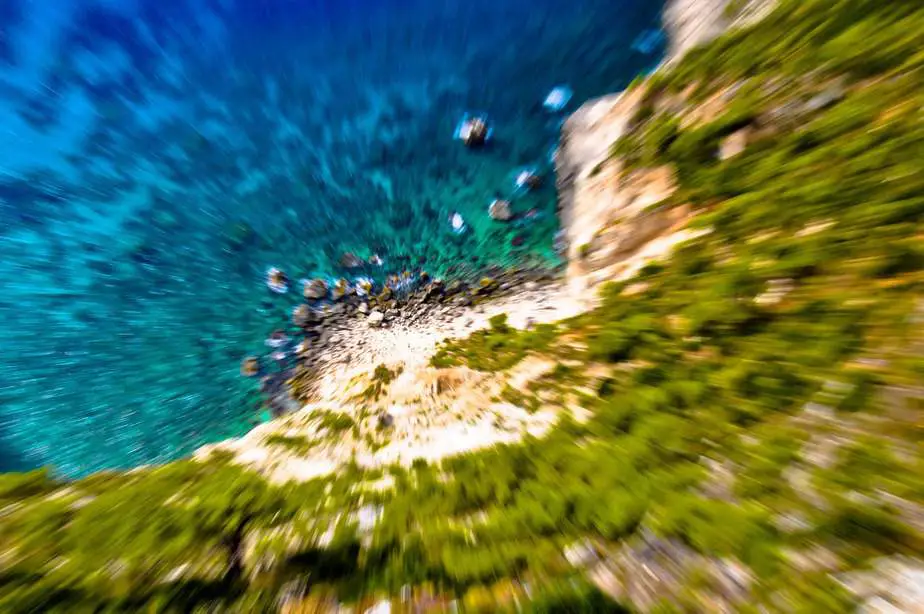Have you ever felt dizzy while snorkeling or shortly after snorkeling? You may be suffering from vertigo. You know how it feels. You’re just floating along without a care in the world when suddenly you feel lightheaded, nauseous, confused, and maybe you feel like vomiting as well. It’d be terrible to lose a full day of snorkeling because of that, so we need to figure out what’s happening.
It’s possible that the act of snorkeling can cause you to experience vertigo. When you’re snorkeling, you are exposing your ears to water, subjecting it to differences in pressure if you’re skin/duck diving, constantly moving up and down as you’re floating along the undulating waves which can cause dizziness, and there is also a risk that the vertigo is related to an existing medical condition.
As you can see, there are many possible reasons why you might experience vertigo while snorkeling. In this article, we’ll discuss the various potential causes of vertigo while snorkeling and how you can deal with them so you can snorkel in peace.
How does snorkeling cause vertigo?

Before we dive into this topic, we need to first understand what vertigo is – what are its symptoms, causes, and treatments.
First, vertigo is not a condition, but rather a symptom. Attacks of vertigo will cause you to feel like either you or the environment around you is moving or spinning. The symptom may be so minor that it’s almost imperceptible, or so severe that you can’t even stand up without assistance.
You may experience vertigo only for a few seconds or it can last for several days in extreme causes. Other symptoms that indicate vertigo are loss of balance, dizziness, and nausea.
The common causes of vertigo include:
- Benign paroxysmal positional vertigo (BPPV) – which is when rapid head movements can trigger vertigo.
- Migraines which cause severe headaches.
- Meniere’s Disease – an accumulation of fluid in the inner ear which causes pressure changes that interferes with the brain’s ability to determine movement.
- Labyrinthitis and Vestibular Neuritis – inner ear infections that affect the labyrinth (hearing and balance organs in the inner ear) and vestibular nerve respectively.
Essentially, some kind of inner ear problem is the cause of vertigo most times, and if you experience an attack, you should seek medical attention before you head into the water again.
Why is vertigo associated with the inner ear? The inner ear affects your balance. It measures your head’s speed and direction as it is moving and sends this information to your brain. The inner ear uses pressure changes and gravity to get information about your movement.
The brain uses the information provided by the inner ear and combines this with visual information provided by the eyes as well as feedback from the joints and muscles to map out where you are spatially in relation to your surroundings.
Attacks of vertigo occur when there is a disconnect between the information being sent to your brain from your body. Until your brain figures it out, you will experience vertigo.
Anything that impedes your ability to measure information will mean incorrect information is being fed to the brain, and when snorkeling, the body part most likely to be affected is the inner ear. Water can come in and out of it. If you’re diving, the inner ear will be subject to pressure changes. Even the up and down motion of the waves can cause problems for the inner ear.
Some other causes of vertigo include head or neck injury, sudden head movements, or certain medications.
When you’re swimming or snorkeling, you are putting yourself at risk of many of these potential causes of vertigo. From the head movements to the rocking of the water, it’s often enough to cause inner-ear confusion.
Outside of specific medical conditions (which we cannot diagnose as we are not doctors), many snorkeling-related issues with vertigo-like symptoms include the following:
Exposure of ears to cold water
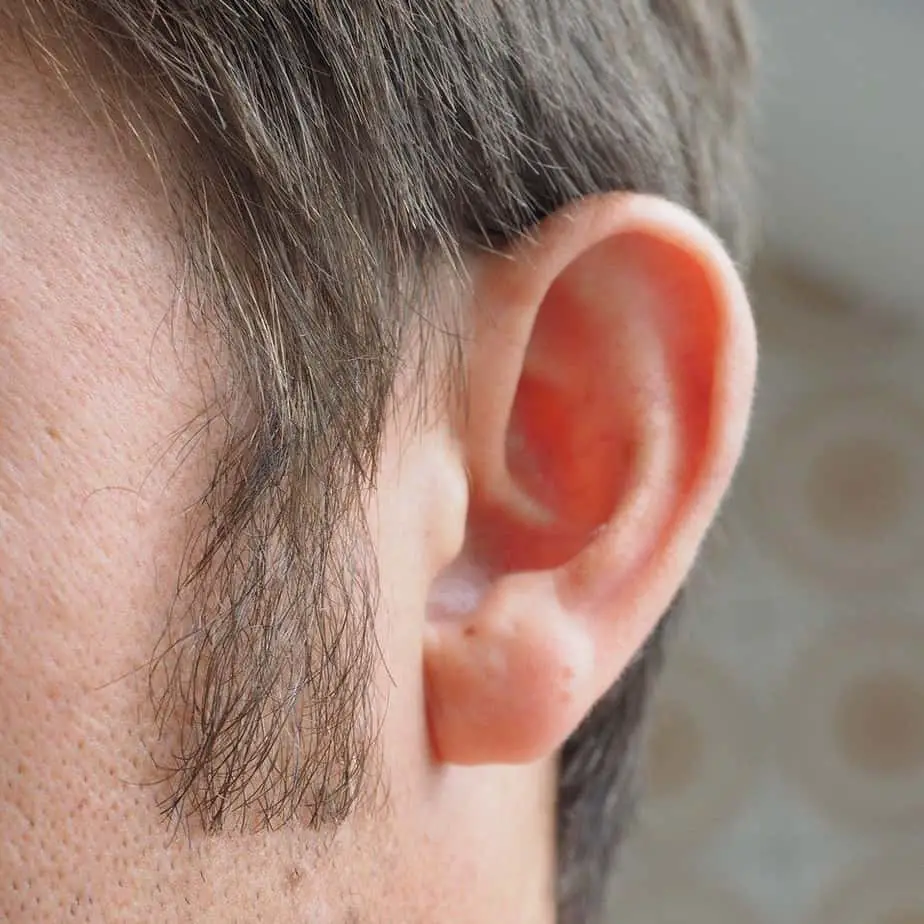
When your ears are suddenly introduced to cold water, it can cause a momentary disturbance in the brain’s balance. This is usually a minor problem that is not even felt as long as both ears are exposed at the same time.
If your ears are exposed to cold water unevenly, for instance if one ear is clogged with wax, or if you’re wearing a dive hood that leaks unevenly, then the difference in temperature and pressure in your ears may cause feelings of vertigo.
Typically, your body heat will warm the water in your ears, and the problem fixes itself. However, if you feel a drastic difference in how water enters your ears, then perhaps you should get them checked out for blockages. If you’re wearing a dive hood, try to get one that fits more evenly. You can deliberately open the flaps near your ears so that you can expose your ears at your own pace.
Furthermore, after you have finished your snorkeling session, there will undoubtedly be some water left in your ear. If that water does not evaporate quickly enough and is allowed to remain in your ears, then the bacteria in the water may survive long enough to give you an ear infection. This is known as swimmer’s ear. Swimmer’s ear is painful and can lead to permanent hearing loss. You can consider wearing vented scuba diving earplugs to keep water from entering your ears in the first place. This also gives you the option to duck dive safely if you want.
Equalization problems
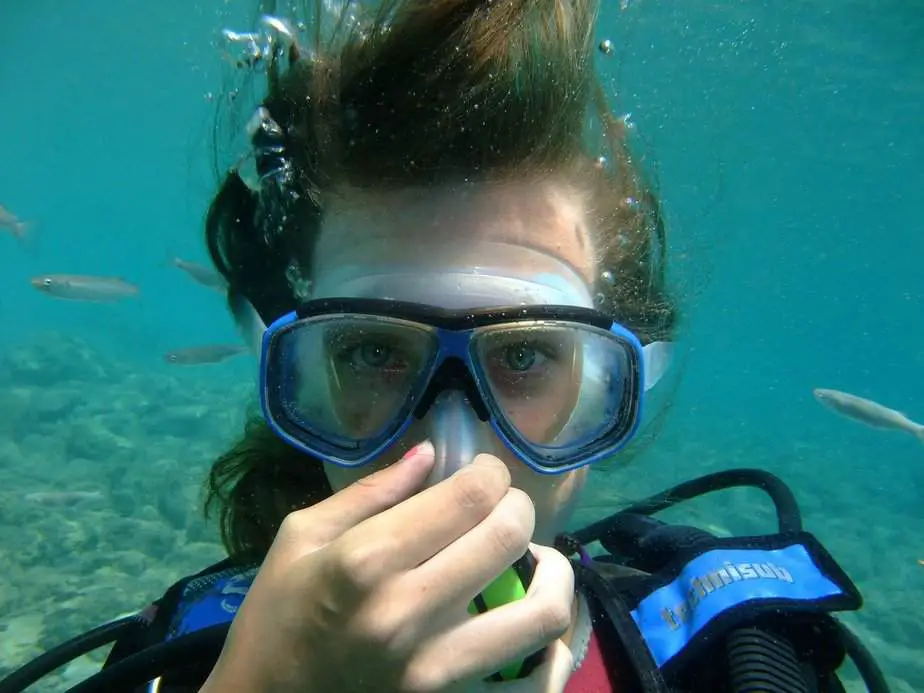
A common cause of vertigo when snorkeling is due to issues with equalization when duck diving. Normally, equalization is a problem that scuba divers and freedivers worry about. However, some snorkelers also duck dive, and they may not be used to equalizing their inner ear.
If you cannot equalize both ears, there will be a pressure difference between your ears. When descending, the unequalized ear will be under immense pressure and this is painful and dangerous. Additionally, on the ascent, the air in the inner ears will expand, and this can create enough pressure in the inner ear that you experience attacks of vertigo.
It’s crucial that you know how to equalize, and that you successfully equalize before diving further. The most common equalization technique is the Valsalva maneuver, which is when you pinch your nose through your mask’s nose pocket and gently try to exhale through it. This should cause the air to redirect elsewhere and open up your Eustachian tubes, which equalizes your inner ear. Read our article on freediving equalization techniques to learn more.
Never duck dive if you have a cold or congestion because this only makes it harder for you to equalize your ears.
Unusual/rapid head movements
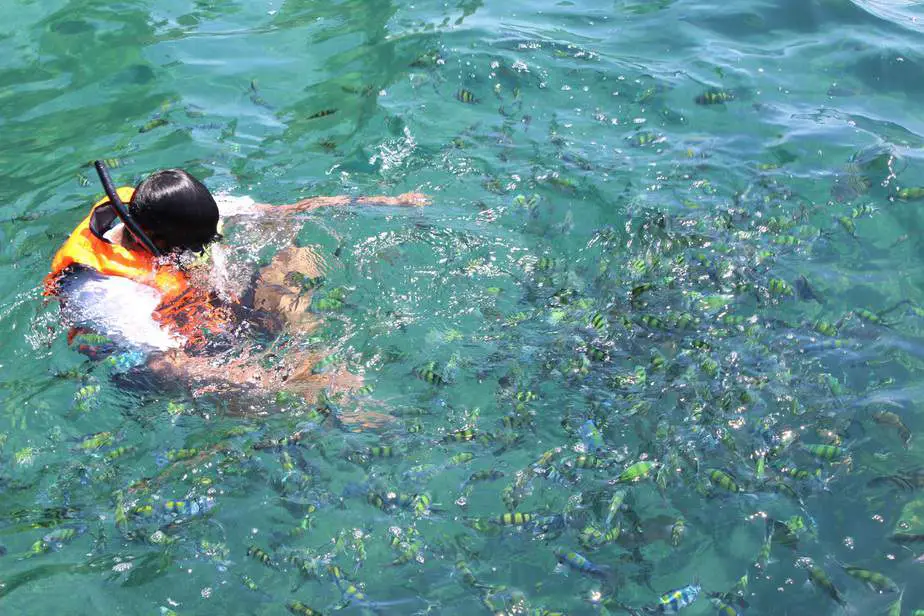
Sometimes, moving your head in an unusual way or moving it very quickly can cause BPPV. This is more common among snorkelers who also duck dive because they are constantly looking down and up as they dive and ascend.
Even a casual snorkeler who is bending their head at various angles to get a better view of their surroundings may accidentally turn their head in an awkward way that makes them feel dizzy.
Improper snorkel size
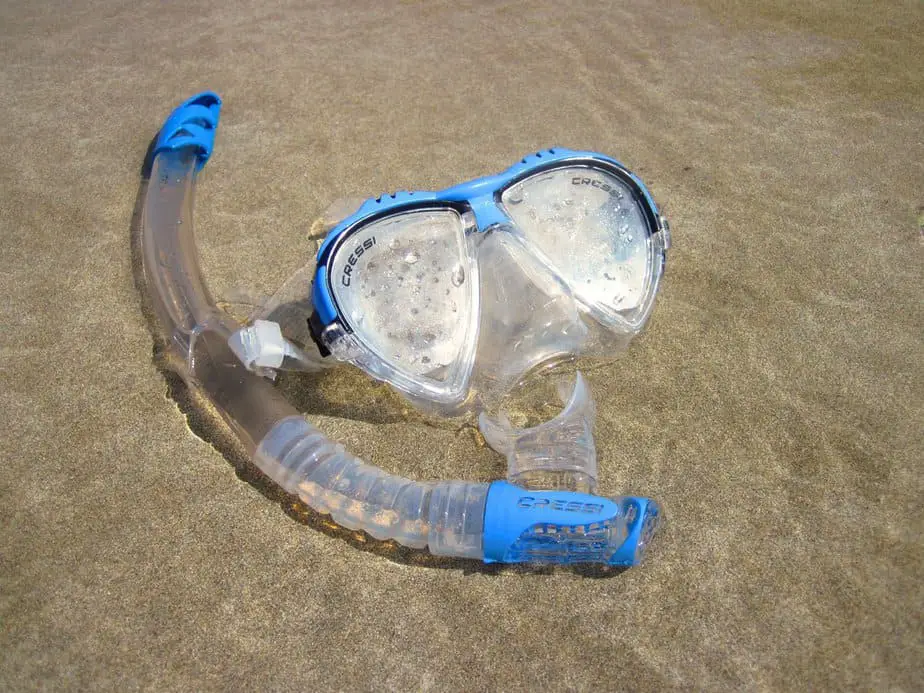
This issue is hard to diagnose, because one also needs to take into account whether they are breathing properly. When you are snorkeling, you should be breathing in and out slowly and deeply, as opposed to rapid, shallow breaths.
Each time you inhale, your lungs take in oxygen, and when you exhale, there will be some amount of carbon dioxide (CO2) and less oxygen in the outgoing breath. The problem with an improperly sized snorkel is that: 1) if it’s too small, you will feel like you’re not getting enough oxygen when you inhale, and 2) if the snorkel diameter is too wide, there is a larger space for dead air to linger.
Dead air is what we just described: exhaled air that has less oxygen and carbon dioxide in it. It can linger in the snorkel tube and get inhaled again on a subsequent breath. After a period of time, you may start to feel lightheaded because you are getting less oxygen than you think you are. Essentially, you are slowly asphyxiating and this is a dangerous situation.
By breathing in deeply and slowly, you have the greatest chance of getting maximum oxygen intake and clearing the snorkel tube of dead air when you exhale.
Lack of visual reference over deep water
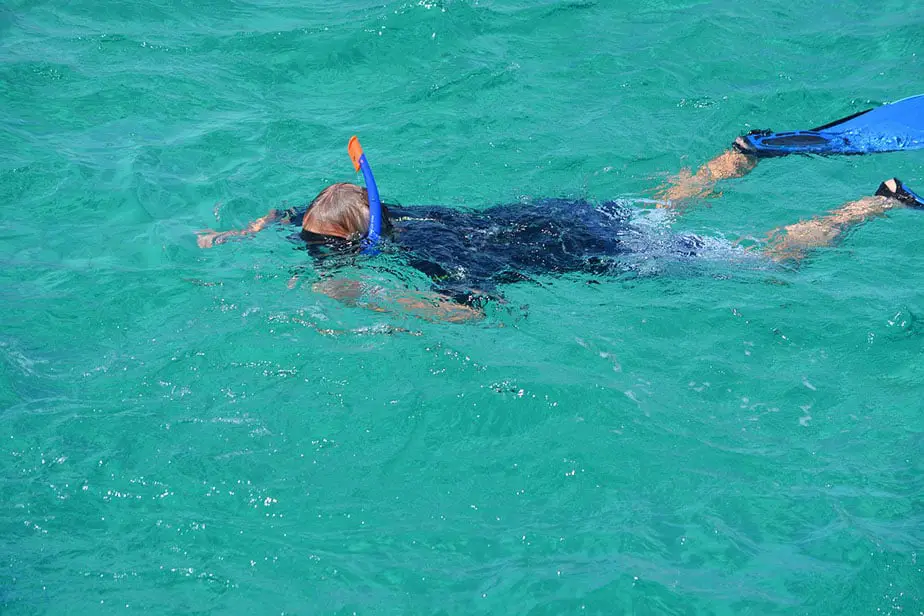
When you’re staring into very deep waters, you can experience vertigo because your brain is struggling to comprehend how deep the depths are and your relation to it. Scuba divers are also likely to experience this, and the solution is to find something to give them a visual reference.
For instance, divers who participate in blackwater diving go scuba diving at nighttime in the open waters while tethered to a boat. Since there is darkness surrounding them, you can imagine that they couldn’t even determine which way was up or down. To aid them, a large light is dropped from the boat as a visual reference to ensure divers aren’t losing sense of where they are.
The equivalent for a snorkeler is to find a visual reference on land that they can focus on, such as a boat or a building/mountain in the distance. This may help them temporarily alleviate their feelings of discomfort and get their bearings back. Ultimately, a repeat sufferer of this should spend more time in shallow waters where they can clearly see the bottom of the reef clearly.
Common causes of dizziness after snorkeling

- Motion sickness. After you finish snorkeling and you’re back on solid land, your brain may need an adjustment period to account for the sudden stability it now has, having gotten used to the constant undulation of the waves.
- Postural hypotension. Similar to how you can feel dizzy if you get up too quickly from a resting position, when you’ve been laying flat while snorkeling and suddenly change to a vertical position, the temporary drop in blood pressure can do the same.
- Mild hypoxia. Remember you must breathe slowly and deeply when snorkeling. Otherwise, your body will not receive enough oxygen, particularly if you have been overexerting yourself. Dizziness or lightheadedness is the result and if you lose consciousness then you will be in extreme danger.
- Ear infection. If the water in your ears does not quickly evaporate after exiting the water, the bacteria in it can cause an ear infection. You can use some scuba diving ear drops to evaporate the water in your ears.
- Dehydration. It’s surprisingly easy to get dehydrated while snorkeling. You may not notice it because you’re having so much fun, but you need to drink plenty of fluids before heading out. Some people hold back because they want to stifle the urge to pee in the ocean, but let’s be honest, everyone does it.
Is seasickness and vertigo the same thing?
Vertigo is used to describe the dizziness associated with a spinning sensation. Seasickness, motion sickness, or nausea would be a common outcome for someone experiencing vertigo.
Is it safe to swim with vertigo?
Vertigo can be dangerous if an attack occurs while you’re swimming without wearing a flotation device. Depending on how severe it is and what caused it, it may not be safe to swim and you should see an ENT (ear, nose, throat) doctor to be safe.
In some cases of BPPV vertigo, swimming was identified as the primary cause. If you suffer attacks of vertigo, you should stay away from swimming until you have come up with a solution with a doctor. It may be possible if, on medical consultation, you change the swimming stroke to one that allows you to swim without vertigo.
Tips to avoid vertigo/dizziness when snorkeling

To start, if you know you are susceptible to attacks of vertigo, you must see an ENT doctor before you head into the water. You should only snorkel if you have been cleared by your doctor.
Next, take some motion sickness medication. Follow the instructions on the label. It may require you to take the medication a day in advance to be effective. This is to help you brace the choppy waters when you’re on the boat ride or if the waters are a bit rough.
A general rule of thumb for almost everything in life is to stay hydrated and fed. Dehydration can exacerbate problems and make it more likely for vertigo symptoms to occur. Consider taking a water bottle with you so you can have a few sips while snorkeling. Limit your snorkeling sessions if they are too long. Also, eat a light meal 2-3 hours prior to snorkeling, and make sure to avoid alcohol.
When breathing, take full, deep breaths. Breathe deeply and slowly to ensure you’re getting enough oxygen and clear the snorkel tube of dead air. This decreases your chances of suffering from hypoxia. If you still feel lightheaded, then float on your back, remove the snorkel, and take some unobstructed breaths. Then end your snorkeling session and ask for assistance to get back on the boat or to shore.
We’re going to rapidfire the next few tips. If it’s raining or windy, then you may experience choppy water that can cause dizziness. The best weather conditions for snorkeling are when there are clear skies and calm waters. Try to limit head movement, or at least don’t make sudden head movements. Also, if you have equalization issues, then don’t duck dive.
Following these general tips can help you avoid most instances of vertigo.
How to deal with vertigo while snorkeling
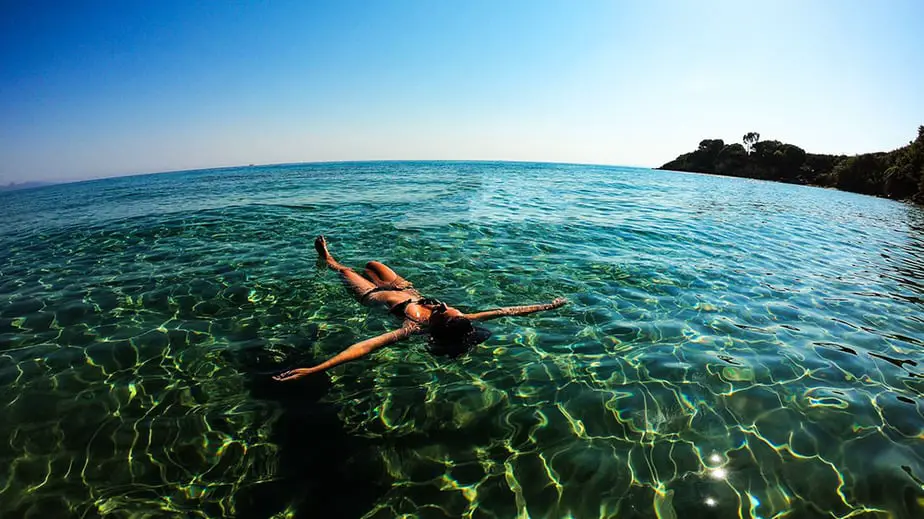
As we mentioned, if you experience vertigo while out in the water, it can be dangerous. Thankfully, most snorkelers wear either a life jacket or snorkel vest, so they can easily stay afloat with their buoyancy aid. The number one priority is to get out of the water so that you no longer have a drowning risk. Here are the steps you should take:
- Maintain a deep and slow cadence to your breathing.
- Focus on a solid visual reference, such as a coral reef or large rock and concentrate on it. Don’t look at anything that’s too far away as that is unlikely to help decrease your vertigo.
- If staying submerged is uncomfortable, then assume a vertical position and keep your head above water.
- Slow down, and breathe deeply and slowly. Let your brain relax as much as possible.
- Try to look for a visual reference above the surface and focus on it. It can be a boat, the horizon, or a building or mountain off in the distance.
- Once the dizziness has subsided somewhat, end your snorkeling session. Call for help to get back to shore or on the boat.
- Once on solid ground, find a comfortable place to lie down or sit down and try not to move your head too much. Let the dizziness subside.
- If the dizziness is too much or has not subsided, then consult an ENT doctor.
How come I only get vertigo while snorkeling, but not scuba diving?
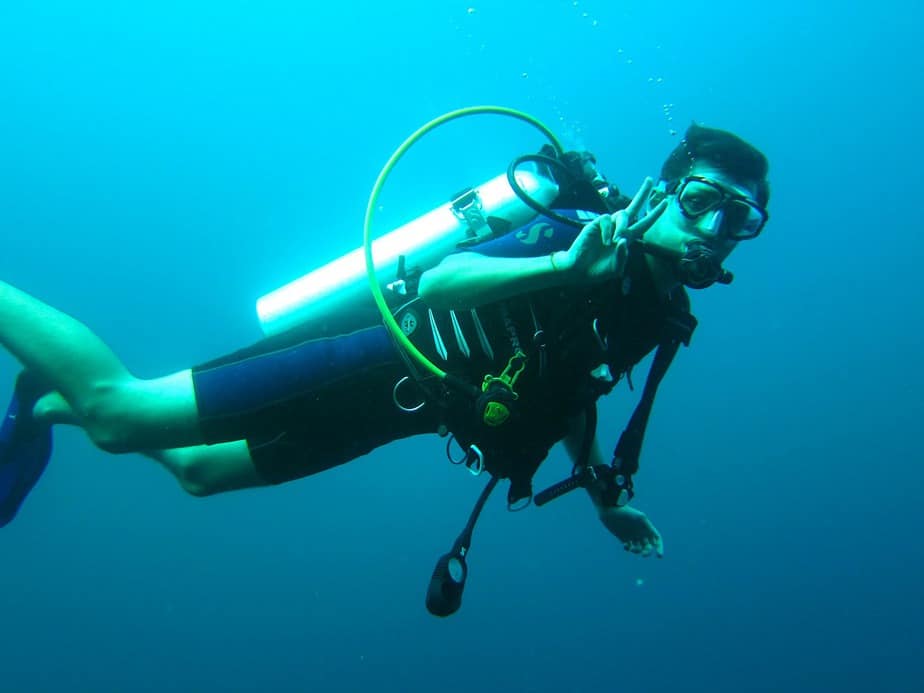
It’s hard to say exactly. We suspect the difference may be due to the surface movement that snorkelers experience that scuba divers don’t. Snorkelers are more susceptible to changes in the weather and currents, whereas scuba divers are somewhat removed from that by being dozens of feet underwater.
Plus, when scuba divers reach neutral buoyancy they are very steadily remaining at the same depth. This ensures that there aren’t constant changes to inner ear pressure and also there are no undulating waves to worry about.
Parting words
Attacks of vertigo can be triggered by snorkeling in choppier waters or when performing rapid head movements. Plus, if a snorkeler also decides to duck dive, then they are introducing extra risk by exposing their ear to changes in pressure. If they have any issues with equalization, this can also cause vertigo.
Snorkeling is also a common cause of general motion sickness and nausea, which, though it’s not the same as vertigo, is just as unpleasant to experience. Thankfully, these can mostly be avoided with some preparation beforehand. If you are a frequent sufferer of vertigo, then you should see an ENT doctor.

